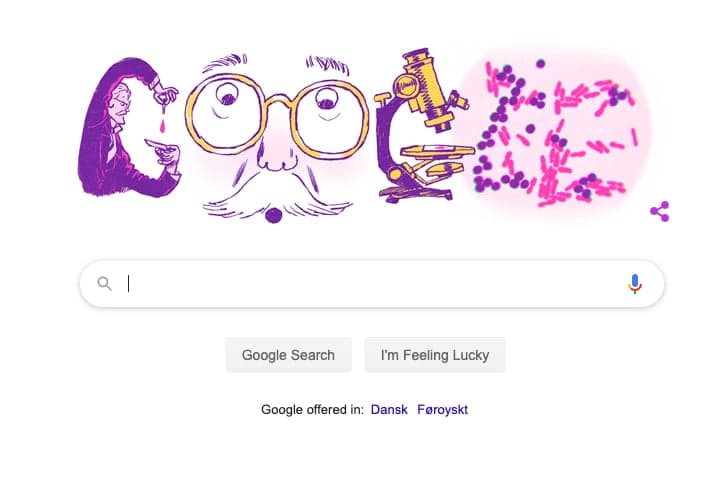Google pays tribute to Denmark’s other famous Hans Christian

Author Hans Christian Andersen is one of Denmark’s most famous figures from the 19th century, but can you name another Hans Christian, who left his mark on the world of science?
Visitors to Google’s homepage on Friday will be greeted by a tribute to a 19th-century Danish scientist.
The search engine’s homepage is marking the 166th anniversary of the birth of bacteriologist Hans Christian Gram.
Gram is known as the inventor of the Gram stain, which is to this day a standard technique used in microbiology for classifying bacteria and making them more visible under the microscope.
The Gram-staining method gave rise to the gram-positive and gram-negative classification of bacteria, with colouring having different effects on the cell walls of different types of bacteria.
The method made it easier to identify different types of bacterial infection.
Gram identified the method after gaining his doctorate at the University of Copenhagen and then travelling around Europe—like his literary namesake did earlier in the 19th century—where he learned more about medicine and bacteriology.
He discovered the Gram staining method in a Berlin laboratory in 1884.
On publishing the method, he modestly noted that “I am aware that as yet it is very defective and imperfect; but it is hoped that also in the hands of other investigators it will turn out to be useful,” according to Google.
The Danish scientist died in 1938 at the age of 85.
READ ALSO: Danish Astronomical Society discovers unique Einstein letters
Comments
See Also
Visitors to Google’s homepage on Friday will be greeted by a tribute to a 19th-century Danish scientist.
The search engine’s homepage is marking the 166th anniversary of the birth of bacteriologist Hans Christian Gram.
Gram is known as the inventor of the Gram stain, which is to this day a standard technique used in microbiology for classifying bacteria and making them more visible under the microscope.
The Gram-staining method gave rise to the gram-positive and gram-negative classification of bacteria, with colouring having different effects on the cell walls of different types of bacteria.
The method made it easier to identify different types of bacterial infection.
Gram identified the method after gaining his doctorate at the University of Copenhagen and then travelling around Europe—like his literary namesake did earlier in the 19th century—where he learned more about medicine and bacteriology.
He discovered the Gram staining method in a Berlin laboratory in 1884.
On publishing the method, he modestly noted that “I am aware that as yet it is very defective and imperfect; but it is hoped that also in the hands of other investigators it will turn out to be useful,” according to Google.
The Danish scientist died in 1938 at the age of 85.
READ ALSO: Danish Astronomical Society discovers unique Einstein letters
Join the conversation in our comments section below. Share your own views and experience and if you have a question or suggestion for our journalists then email us at [email protected].
Please keep comments civil, constructive and on topic – and make sure to read our terms of use before getting involved.
Please log in here to leave a comment.